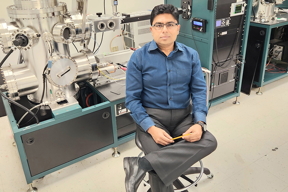Home > Press > UCF researcher receives Samsung International Global Research Outreach Award: The award from the multinational electronics corporation will fund the development of infrared night vision and thermal sensing camera technology for cell phones and consumer electronics
 |
| UCF researcher Debashis Chanda is an expert in infrared imaging, including using nanoscale engineering to improve infrared detection and concealing objects from infrared vision. |
Abstract:
Debashis Chanda, a professor in the University of Central Floridas NanoScience Technology Center, recently received Samsungs International Global Research Outreach Award for the year 2022 in the Future Camera and Sensor category. This is the first such award to UCF.
UCF researcher receives Samsung International Global Research Outreach Award: The award from the multinational electronics corporation will fund the development of infrared night vision and thermal sensing camera technology for cell phones and consumer electronics
Orlando, FL | Posted on January 27th, 2023
The Samsung Global Research Outreach program is designed to foster international technological innovation.
The award from the multinational electronics corporation will fund the development of infrared night vision and thermal sensing camera technology for cell phones and consumer electronics.
The thermal sensing technology could be used to inspect thermal signatures, such as faulty parts of windows or doors where heat is leaking.
UCF is one of 21 institutions, including the Massachusetts Institute of Technology, Stanford University, Princeton University and John Hopkins University, selected for the awards for this year.
Inspired by how a vipers eye works, Chanda and his team will work to design the camera so that it requires minimum power to operate and can be easily integrated into consumer electronics products.
Snakes, like vipers and rattlesnakes, can actually see in the night, Chanda says. Their eye structure is very complicated with advanced optics so that they can actually detect weak infrared photons in the night. So thats the kind of thing I plan to mimic in an artificial infrared camera.
Chanda is an expert in infrared imaging, including using nanoscale engineering to improve infrared detection and concealing objects from infrared vision.
There are many different platforms weve developed as part of government and defense funding, Chanda says. Weve published journal papers that show we could develop these infrared detectors and camera sensors, but so far not for consumer electronics. Since Samsung is more of a consumer electronics company, now the focus will be more on consumer products.
The technology works by using a nanoscopic pattern to maximize infrared photon absorption allowing even weak signals to be detected. The nano pattern, along with the use of a phase-change material, increases the systems efficiency and eschews the need for expensive and cumbersome cryogenic cooling typically need for infrared imaging.
Chanda says challenges will include ensuring the imaging sensor remains extremely small and that it is low cost so that it can be integrated into a consumer electronics product.
The Global Research Outreach program provides funding of up to $150,000 per year to academic institutions, with the potential to fund up to three years of research activities per project. More information about the Global Research Outreach program can be found at: https://www.sait.samsung.co.kr/saithome/about/collabo_overview.do
Chanda has joint appointments in UCFs NanoScience Technology Center, the Department of Physics and the College of Optics and Photonics. He received his doctorate in photonics from the University of Toronto and worked as a postdoctoral fellow at the University of Illinois at Urbana-Champaign before joining UCF in Fall 2012.
####
For more information, please click here
Contacts:
Robert Wells
University of Central Florida
Office: 352-213-5481
Copyright © University of Central Florida
If you have a comment, please Contact us.
Issuers of news releases, not 7th Wave, Inc. or Nanotechnology Now, are solely responsible for the accuracy of the content.
News and information
![]()
Stability of perovskite solar cells reaches next milestone January 27th, 2023
![]()
Qubits on strong stimulants: Researchers find ways to improve the storage time of quantum information in a spin rich material January 27th, 2023
![]()
Temperature-sensing building material changes color to save energy January 27th, 2023
Possible Futures
![]()
Stability of perovskite solar cells reaches next milestone January 27th, 2023
![]()
Danish quantum physicists make nanoscopic advance of colossal significance January 27th, 2023
![]()
UC Irvine researchers decipher atomic-scale imperfections in lithium-ion batteries: Team used super high-resolution microscopy enhanced by deep machine learning January 27th, 2023
Announcements
![]()
Temperature-sensing building material changes color to save energy January 27th, 2023
![]()
Danish quantum physicists make nanoscopic advance of colossal significance January 27th, 2023
Grants/Sponsored Research/Awards/Scholarships/Gifts/Contests/Honors/Records
![]()
UC Irvine researchers decipher atomic-scale imperfections in lithium-ion batteries: Team used super high-resolution microscopy enhanced by deep machine learning January 27th, 2023
![]()
Polymer p-doping improves perovskite solar cell stability January 20th, 2023
![]()
The National Space Society Congratulates NASA on the Success of Artemis I Same-day Launch of the Hakuto-R Lunar Landing Mission will Help Support Future Lunar Crews December 12th, 2022










